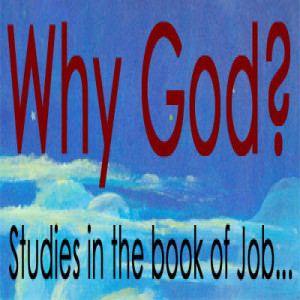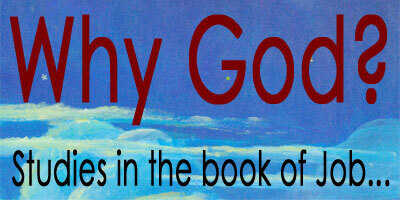
432.4K
Downloads
3357
Episodes
G’day and welcome to Partakers Christian Podcasts! Join us for uplifting Bible teaching, inspiring readings, heartfelt worship, powerful prayers, and fascinating church history. Whether you’re new to faith or growing deeper in your journey, we’re here to encourage and equip you. 🎧 Tune in, interact, and be inspired—wherever you are in the world.
G’day and welcome to Partakers Christian Podcasts! Join us for uplifting Bible teaching, inspiring readings, heartfelt worship, powerful prayers, and fascinating church history. Whether you’re new to faith or growing deeper in your journey, we’re here to encourage and equip you. 🎧 Tune in, interact, and be inspired—wherever you are in the world.
Episodes

Friday Jan 19, 2024
Job - Why God? - Part 2
Friday Jan 19, 2024
Friday Jan 19, 2024

Study 2 : Job 3, 4, 6, 8
Job finds his voice; he and his friends argue.
The pattern of the book is simple. Within the frame given by the prose of the first two and the last chapters and following an opening speech from Job there are 3 cycles of speeches: Eliphaz, Job, Bildad, Job, Zophar, Job and round twice more. That should be 3x6 = 18 speeches but the last speech of Zophar is lost, perhaps deliberately to show the answers are incomplete.
The next chapter after these cycles of speeches (28) is a poem to Wisdom. That is followed by a speech of Job and a lengthy rant by a 4th guy, Elihu. Only then do we hear from the Lord God himself, pointing out how Job has failed to understand what has happened and to learn from it. Then, finally, there is an epilogue, probably drawn from the old tale, which is used to teach one final fundamental lesson about life.
The poetic dialogue begins after those first 2 chapters of prose we thought about last time. Job expresses his total horror at what has happened to him in chapter 3; his first friend, Eliphaz, tries to analyze what has happened to him; Job replies and then a second friend Bildad speaks, expressing his view of Job’s problems more openly and clearly than Eliphaz did. I will read chapter 3, then a little of what Eliphaz said in chapter 4, and part of Job’s reply, then we will skip to what Bildad says in chapter 8 and Job’s reply.
Here is Job’s lament in chapter 3: 1 - 19. Note how striking the poetry is.
All that is very understandable. There is next to no sign in the Old Testament that they had any idea of a life after death except a descent to Sheol for an experience they knew nothing about. The NT is very different. There we find statements like “longing to be clothed with our heavenly dwelling, so that what is mortal may be swallowed up in life” in 2 Cor 5: 4.
Question: why the difference between the OT ideas and those of the NT? What should our reaction be?
Answer: of course this all hinges on the resurrection of Jesus Christ. “Death is swallowed up in victory” as Paul says. We know that we should never share these negative attitudes of Job whatever happens to us in this life.
At this point I will skip to the next chapter because the last few verses of that chapter do not add much to the argument of the book. I will be doing this through these studies, picking out the most interesting and important bits of the book. That isn’t to say that it is not worth reading it all. It is. Here then is Job 4:1–9.
Eliphaz asks a very sharp and important question to all those of us who make a Christian profession. “Should not your piety be your confidence and your blameless ways your hope.” In other words he is asking whether Job was righteous just because it was the best thing to be from his point of view. Are we Christians because this is the best option – we can live more comfortable lives as Christians, or as sometime Christians (when it suits us) - we can keep the family happy – it sounds good in the community – we want to go to heaven when we die?
Question: are you a Christian for these or any other selfish ‘you based’ reasons.
Answer: the answer is yours, obviously. We should be Christian - we should be following Jesus -because we feel compelled to do so by who he is and what he has done for us, oblivious to our own immediate comforts. 200 years ago those who went on mission to the west coast of Africa lived on average for only a few months before they caught one of the lethal diseases of that area to which they had no natural immunity. They did not consider themselves, their own comforts and even their own lives, as of any significant account in the service of the King. Neither should we.
Eliphaz continues in 4: 12 – 21. In a very striking passage he says he has had a dream which introduces the idea that will persist throughout all the speeches of all Job’s four friends (if friends they can be called) that Job must have done some thing very wicked for all this to have happened to him.
Part of Job’s reply is in chapter 6: 2 - 4, 14 – 17, 21 – 30. That brings a reply from his second friend Bildad in chapter 8.
It is now clear that the friends, and even Job himself, are working from the assumption that bad things only happen to bad people. Therefore Job must be in so much trouble because he is a bad person, having undisclosed sin in his life, which he is hiding from them and even from himself. We know what they don’t know, that that is not the case. Job has experienced all his troubles only as a result of what the author has described as a discussion in the heavenly counsel. Or in other words he is experiencing what I called the NCL, the normal chaos of life. We have to accept that sometimes things just happen for no reason that we can discern. Sometimes things happen because of other people – it was the Sabeans and the Chaldeans that stole all Job’s huge herds of oxen, donkeys and camels. But sometimes it is natural forces - it was lightning and storm that killed his sheep, his servants and his children.
That is our experience too. Some of the chaos of life we experience is because other people, unwittingly or deliberately, have disturbed the even progress of our existence. Some of the chaos is because of all sorts of natural things, tsunamis and storms, illness and accident, which may have deeply affected our lives.
That is the way the world is – for us as for Job. We don’t know why the world is this way, why it is so full of chaos, though we may think that a world in which there were no storms, no winds, no floods, would be a very boring and uninteresting place. God, the Lord has never promised to protect us from such things. He has promised to protect us through them. Isaiah said, speaking for the Lord to his people,
” When you pass through the waters,
/ I will be with you;
and when you pass through the rivers, / they will not sweep over you.
When you walk through the fire, / you will not be burned; / the flames will not set you ablaze.
For I am the Lord your God, / the Holy One of Israel, your Saviour;
He does not say I will help you to avoid the rivers and dodge the fires. But when you are in them, battling with them, I will be with you.
Job will eventually understand, by the end of the book, but he is not there yet. He does not understand about the NCL – the normal chaos of life; nor does he realise that the CEP does not work – there is no cause/effect principle operating in moral and ethical life. Our piety does not protect us from what Job calls ‘the arrows of the Almighty’ in chapter 6 (which possibly gave rise to Shakespeare’s phrase ‘the slings and arrows of outrageous fortune’.)
Jesus clearly agrees. When told about the Galileans whose blood Pilate had mixed with their sacrifices. He says ‘Do you think that these Galileans were worse sinners than all the other Galileans because they suffered this way? I tell you, no! But unless you repent, you too will all perish. Or those eighteen who died when the tower in Siloam fell on them – do you think they were more guilty than all the others living in Jerusalem? I tell you, no! But unless you repent, you too will all perish.’
We simply have to accept that the world we are in, the created world, created by our loving God, is subject to the Normal Chaos of Life and that no Principle of Cause/Effect operates.
Too many people, too many Christians, try to convince themselves that there is no such thing as NCL. They say that the Lord is in control so there cannot be chaos. He is indeed in control but we do not know what he is doing, or why, so we are far better to accept that it looks like chaos to us and get on with living in our chaotic looking world.
Too many people, too many Christians, think that the CEP does operate and get very upset, sometimes even losing their faith, when it doesn’t work the way they think it should. They say things like ‘my lovely son or daughter died – life’s not fair – so I can’t believe in God any more.’ Why do they do that? He never promised a CEP. Why should he be blamed when it is clear there isn’t one?

No comments yet. Be the first to say something!